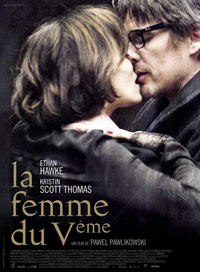May try Your Patience to the Nth: Pawlikowski’s Comeback Thriller Travels in Familiar Territory
 Highly esteemed director Pawel Pawlikowski’s first feature since 2004’s excellent My Summer of Love is an adaptation of Douglas Kennedy’s novel, The Woman in the Fifth, an American in Paris thriller with a tweak of Kafkaesque happenings. Much like Kafka’s novel Amerika , which was written without its author ever having traveled there, much of Pawlikowski’s latest feels like a vague dream, though one that’s listless and evaporates quickly upon awakening.
Highly esteemed director Pawel Pawlikowski’s first feature since 2004’s excellent My Summer of Love is an adaptation of Douglas Kennedy’s novel, The Woman in the Fifth, an American in Paris thriller with a tweak of Kafkaesque happenings. Much like Kafka’s novel Amerika , which was written without its author ever having traveled there, much of Pawlikowski’s latest feels like a vague dream, though one that’s listless and evaporates quickly upon awakening.
Ethan Hawke stars as an American author, Tom Ricks, suddenly absconding to Paris to be near his daughter. The bespectacled Ricks quickly finds his estranged wife who is anything but pleased to see him. Immediately she calls the police while he searches her flat for his daughter. After he falls asleep on a bus, he discovers he has been robbed and must beg the owner of a seedy hotel for refuge. The hotel owner, a racial other, we immediately sense is involved in a variety of nefarious deeds. He offers Ricks a mysterious post as a night watchman with very specific operating instructions. Ricks, we quickly learn, is somewhat of a dolt and doesn’t seem to prize his physical well-being very much, violating the rules of his post, antagonizing his hotel neighbor by tattling on him for not flushing the toilet and bedding the hotel owner’s Polish girlfriend who works as the barmaid and loves the poet Cyprian Norwid. Meanwhile, Hawkes is seen fingering the spine of his only published novel at a bookstore and manages to be invited to a literary party where he meets a mysterious woman from the fifth arrondissement. The compelling Margit (Kristin Scott Thomas) tells her widow’s tale, having once been married to a natively famous Hungarian writer. It’s apparent they will soon be sleeping together. When Ricks’ hotel neighbor is found viciously murdered with a toilet bowl scrubber jammed in his maw, Ricks becomes prime suspect, leading to a bevy of plot twists.
The Woman in the Fifth’s biggest issue is the distance it develops between itself and the audience, mostly through its depiction of Hawke’s idiot author character. Hopelessly insipid, he sports no winning qualities and the only thing evident about him is that we should definitely be questioning his sanity. And of course, we should always be wary of mysterious, statuesque women like Scott Thomas that get sexy sexy by their second scene. While the screenwriting attempts to be evocative, its vagueness mixed with the tone established by Pawlikowski is more like a symphony in discord—everyone’s trying to play as hard as they can rather than work together. Hawke seems poorly cast—he’s certainly no Josef K. archetype. The amazingly stilted feeling you may have as the credits roll may be brilliant in its necessity to be discussed with others, but mostly you’ll remember the tangled trails of threads it unspools and never picks up again.
Reviewed on September 11 at the 2011 Toronto Int. Film Festival – SPECIAL PRESENTATIONS Programme.
83 Min.


